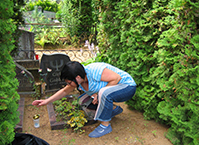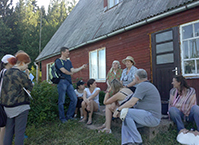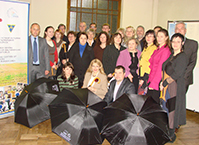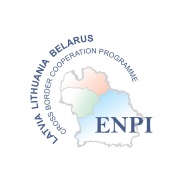School in Borisov
Categories: Study and work, Ira Motolyga
When you went to school boys and girls studied together?
Together in the first grade. I remember these teachers, they lived in a wooden house, and there was also the school in Borisov.
Was it a Russian-language school?
Yes, that was immediately after the war. Our teacher was Pyotr Ignatievich, and his wife taught geography, and he taught Russian. A first teacher was in Borisov and it was only in Borisov. Yes, in the fourth grade there were already different teachers, and our first teacher was Anna Robertovna wearing such a hat. She was thin; probably, she was a German that had been Russified. Oh, that was a nasty teacher, she slapped us on the wrist, she crept up, and hit you if you talked, she tore notebooks. Oh, she was a wicked-wicked teacher. If you wrote badly she would tear a notebook and then you just cry on this notebook.
Did you have a school uniform?
Yes, but probably we didn’t have money to buy school uniform in the first grade, I remember that skirt. And by the way, I was big when I went to school, I was not seven years old but more, because my mom shoved me to the kindergarten as there wasn’t anything to dress and eat. And then I was sent to school. I remember it well. Grandmother sewed these sneakers from the uniform jacket and sewed them round with red thread (I vividly remember) and put such a red button from the uniform jacket. I remember that. She sewed such a bag from this uniform jacket that was buttoned up, this bag was hanging side-on, and there was a ink and inkpot in the bag, and I was given two ink pens in store. And I had them broke very often, and I was often scolded by my grandmother. That I wouldn’t get ink pens any more. This I remember well.
And what kind of skirt did you wear?
That was a terrible skirt, my grandmother sewed it herself. It was long, with rustic blouse, white in small little blue flowers and it was tied with the belt. It’s even worse than you can imagine. These bags, these slippers, but I had long braids; grandmother braided and sent me to this school. In general, I was, of course, terrible. We wore school uniforms when we already were in the 4th grade, we had different teachers. And we have to wear school uniform. School uniform was beautiful. I loved this uniform. Brown dress with Richelieu embroidery collars. They were handmade; also we had embroidered cuffs, and a black apron. Those who were richer had them made of staple, staple is such a material. Such a black apron. We were not very rich. We had such a simple apron made of backing material, also in black colour. Well stitched. I do not know who sewed, but it was well-done. We bought in the store, there were such three folds, and there were black and white ribbons. A black apron was for every day, a white one was for the holidays. We always had a white apron. It had folds in front and a bow behind, and when it was a holiday we wore white aprons. We put on red ties. I was not admitted to the Pioneers. I had a two-mark in the Belarusian language, I could not learn it. My teacher Cherkasova, so I remember the teacher well, such a beautiful teacher, they said that she had a rich husband, she always opened the door with her foot, I remember. She pushed me once, and I cried. I couldn’t learn the Belarusian language. We came from Russia, and I could not master the Belarusian language.
Were you upset that you weren’t a pioneer?
I cried, they did not admit me. They did not admit non-achievers. She put me a two-mark and told to learn the Belarusian language. I was boning up on it all day, and I could not learn it. And then the director gave me a break and said, «Let not write, let read at least». Well, it troubled me a lot. Elder sister mastered it, I could not master. And generally, I confused everything. Because of this two-mark I was not admitted to the pioneers, everyone wore ties and non-achievers were put apart and we were standing and admiring.
And what did the school farewell party look like? Did you already sew dresses?
Yes, we sewed these white dresses of staple. Those who were richer did. We lived in a military camp, there was a lot of the military who had already served in Germany, they were well dressed, my girlfriends graduated from the 10th form and married to the military, went to Germany, they came here, Valya Rusevich was very well-dressed. There were a lot of girls well-dressed.
Images
Audio
Researcher: Наталья Иващенко, кандидат исторических наук, ГрГУ им. Я. Купалы, Светлана Силова, кандидат исторических наук, доцент, ГрГУ им. Я. Купалы











